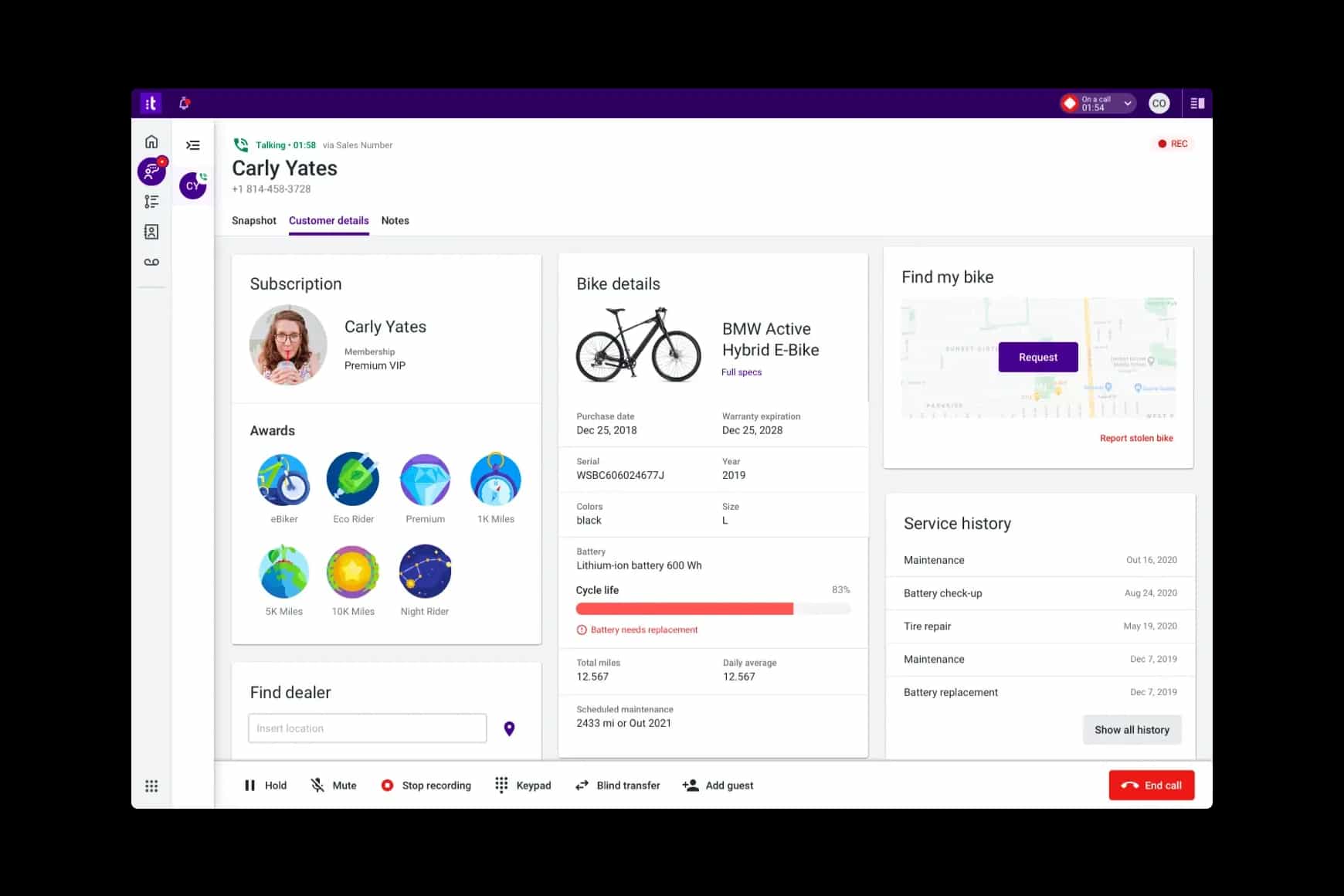How AI agents elevate—not eliminate—contact center agents

By Toussaint Celestin
0 min read

Working in a contact center has never been easy. Agents face high call volumes, emotionally charged conversations, and the challenge of navigating numerous siloed systems—all while trying to deliver fast, empathetic support. It’s no surprise that stress and high turnover remain industry-wide concerns.
With the rise of AI agents, there’s a new way forward—one that’s rooted in partnership, not replacement. AI takes care of the chaos behind the scenes, giving agents the freedom to focus on what they do best: connecting with customers on a more personal level. These intelligent systems are transforming contact center operations by doing what machines do best: processing information quickly, anticipating needs, and delivering answers in real time.
From retrieving data across multiple systems to summarizing interactions instantly, AI agents remove the friction that holds agents back. Even more so, they can act autonomously to proactively predict and handle needed workflows or knowledge access as well as execute repetitive tasks that can bog down an agent.
With these applications, the power of AI technology fades into the background even as it enhances performance, allowing people to shine. With the cognitive load reduced, agents can focus on higher-value work, connecting with customers, resolving issues more thoughtfully, and delivering the kind of experience that turns customer frustration into long-term loyalty.
At the center of this transformation is a powerful realization: the best customer experiences happen when humans and AI work side by side.

AI Agents
Unleash the power of AI Agents.
The intelligent decision-making tool that analyzes customer data and automates self-service with a single prompt.
A three-stage framework for AI-enhanced contact centers.
To understand the true impact of AI agents, it helps to frame their role across the three main stages of the contact center experience.
The first touchpoint: Smarter self-service.
Customer journeys often begin with an automated interface—traditionally, a clunky interactive voice response (IVR) menu or a basic chatbot, but today’s AI agents are rewriting that script.
Unlike past systems that relied on rigid scripts and limited responses, AI agents use natural language processing (NLP) as well as generative and Agentic AI tools to understand everyday speech, interpret intent, and deliver accurate answers in real time. Instead of asking customers to adapt to robotic language, these systems adapt to human speech—mispronunciations, muffled voices, even multiple languages—which means customers can speak naturally and always be understood.
Behind the scenes, AI agents are continually training themselves using vast interaction datasets. They learn from thousands of real-world conversations, dramatically reducing the need for manual scripting or guesswork. The results are smoother interactions, less frustration, and a first impression that actually delivers.
The second touchpoint: Live agent support.
When self-service alone can’t resolve an issue, customers escalate to a live agent. It’s here, during high-stress, high-stakes moments, that AI proves its worth as a true partner.
AI agents are always analyzing conversations in real-time, proactively feeding agents information or guiding them with empathic cues or even real-time language translation. If a customer asks, “Where’s my order?” the AI copilot doesn’t wait for the agent to type in a query. It proactively pulls data from the shipping platform, order system, and CRM—presenting precise context-relevant information and scripted answers before the agent even clicks a button. Proactive knowledge management is one of those valuable benefits that makes a big difference in customer engagement. After all, getting the most accurate information to a customer in the least amount of time is the foundational mandate against which all good service is measured.
This proactive support doesn’t just boost response times—it reduces stress for agents, especially new hires who may still be navigating complex internal tools. With AI providing real-time insights and data delivery, agents can focus on what they do best: building rapport, demonstrating empathy, and solving problems with a human touch.
The third touchpoint: AI-powered supervisor insights.
AI also plays a critical role in back-office roles. Supervisors and administrators use AI agents to track key performance indicators (KPIs), such as average handle time (AHT) and first contact resolution (FCR), to identify training opportunities and pinpoint friction points across the customer journey.
With real-time analytics, AI can detect whether calls are ending on a positive or negative note, giving supervisors insight into customer sentiment and an agent’s ability to respond with the appropriate emotional tone. It can also flag areas where agents may need coaching or where knowledge gaps exist in self-service systems. In short, AI ensures continuous improvement by turning every interaction into actionable intelligence. It does this while providing administrators with oversight and compliance tools to ensure private information is always protected with trusted, robust guardrails.
Addressing the challenges of AI integration.
Despite the promise, successful AI adoption can be a daunting proposition that involves considering multiple factors. Part of the evaluation process should include consideration of two foundational elements: data readiness and human alignment regarding workflow change management.
Many organizations underestimate the effort required to make their data usable. Information may be trapped in legacy systems, PDFs, or even physical binders. For AI to deliver results, businesses must first centralize their knowledge, standardize formats, and ensure data is searchable by AI models.
Equally important is preparing the workforce. Contact center agents need to understand that AI isn’t replacing them—it’s helping them. Clear communication, thoughtful training, and change management are key to building trust and adoption.
How AI affects contact center KPIs.
Traditional performance metrics—such as average handle time (AHT), first call resolution (FCR), and customer satisfaction score (CSAT)—are still relevant and important to measure. Recently, AI has introduced new dimensions of measurement, including:
-
Sentiment analysis. AI can detect a customer’s emotional tone in real-time and either alert the agent to adapt communication to meet the customer where they are or rewrite a more fitting text-based response.
-
After-call work reduction. AI-generated summaries can shave 30 to 60 seconds off post-call tasks, boosting agent productivity and consistency.
-
Proactive resolution insights. By analyzing patterns, AI can suggest updates to knowledge bases or flag recurring customer pain points. It can also help supervisors identify areas for agent improvement to help turn “B” players into “A” players.
These metrics help organizations improve performance while also delivering more personalized and emotionally intelligent service.
AI still can’t replace what makes us human.
For all its capabilities, AI has limits. There will always be edge cases—urgent, emotional, or highly personalized scenarios—where human judgment is essential. Think about a delayed wedding dress delivery or a customer dealing with a medical emergency. These are moments that demand empathy, flexibility, and emotional nuance, which may not be effectively handled by AI alone.
Likewise, institutional knowledge—often unstructured and passed down informally—remains difficult to codify. AI can only work with the data it’s given, and many insights still live in human minds. However, forward-looking companies are beginning to address these issues with proactive knowledge management systems that auto-create and update information for self-service and agent-assisted interactions.
Overall, AI may be an expert in patterns, but humans are masters of connection. And that’s something no algorithm can replicate.
AI that supports the people behind great customer experiences.
At its best, AI doesn’t replace people—it enhances their potential. In the contact center, that means equipping agents to deliver faster, more accurate, and more meaningful service.
Talkdesk believes in offering AI solutions that amplify human strengths. By reducing stress, increasing speed, and maintaining empathy, AI agents ensure that customer service remains not just a transaction, but a relationship.
Ready to supercharge agent performance with AI that complements instead of competes? See what’s possible with Talkdesk AI Agents.





